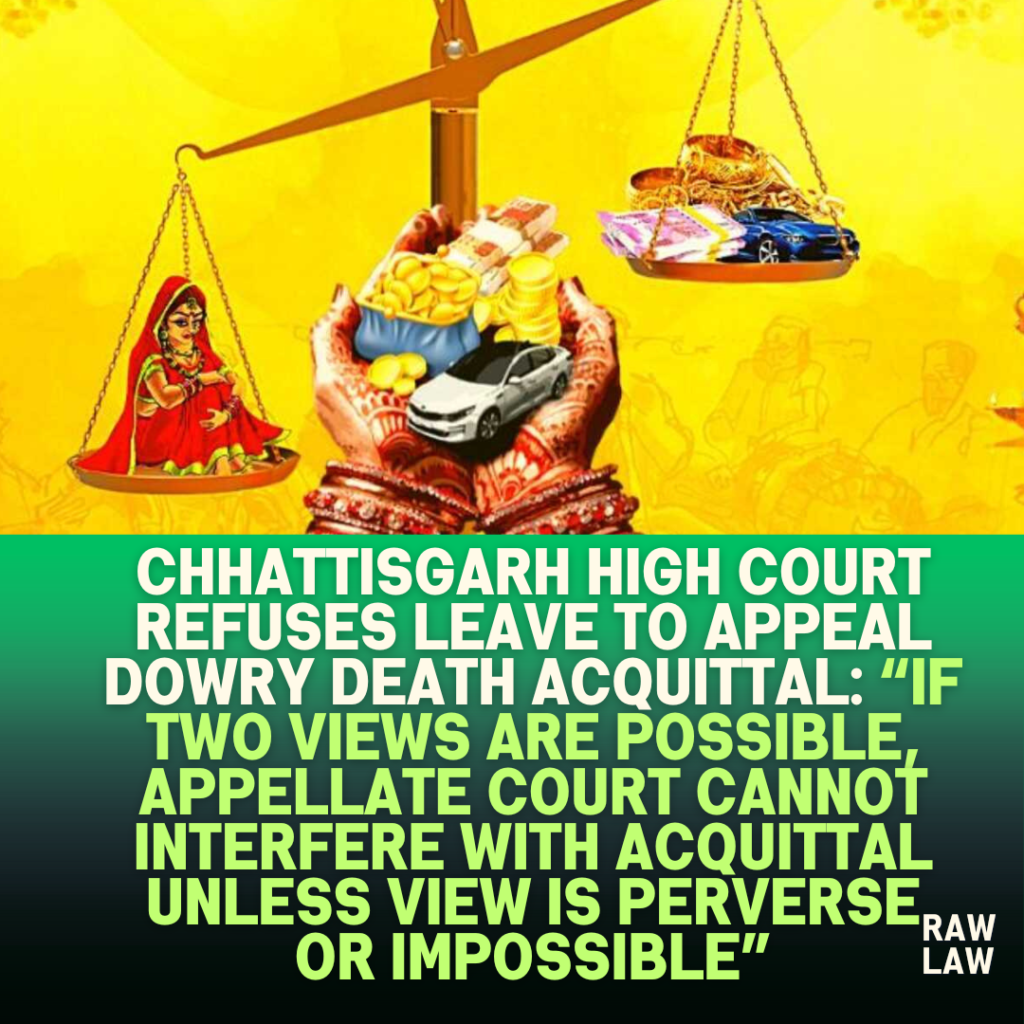Court’s Decision
The Chhattisgarh High Court, comprising Chief Justice Ramesh Sinha and Justice Bibhu Datta Guru, dismissed the State’s Criminal Miscellaneous Petition seeking leave to appeal against the acquittal of an accused in a dowry death case. The Court held that there was no perversity or impossibility in the trial court’s view, stating:
“Unless it is found that the view taken by the Court is impossible or perverse, it is not permissible to interfere with the finding of acquittal.”
The Court relied on the Supreme Court’s judgment in State of Rajasthan v. Kistoora Ram (2022 SCC OnLine SC 984), and dismissed the State’s petition along with the connected appeal.
Facts
The prosecution’s case arose from the suspicious death of a woman on 21.05.2019. According to the deceased’s father-in-law, the family had gone to sleep on the night of 20.05.2019 after dinner. The deceased’s husband had gone for night duty at Manikpur mine. The deceased, who had reportedly not eaten, was found dead the next morning. Foam was found at her mouth, and it was suspected that she consumed poison.
A Merg intimation (unnatural death report) was registered under Section 174 CrPC. A site map was prepared and a panchnama was conducted. The body was sent for post-mortem to the Primary Health Centre, Korba. Dr. M.L. Bhariya (PW-11), in his post-mortem report (Ex. P-17), opined the death was “probably due to cardio-respiratory failure caused by poison.” The viscera was sent to the FSL, which confirmed the presence of poison (Ex. P-24).
Later, based on the investigation and the complaint, an FIR was registered against the respondent under Sections 304B and 34 IPC. Thirteen witnesses were examined by the prosecution during trial. The accused did not examine any defence witnesses and denied the allegations.
Issues
- Whether the trial court committed any legal error in acquitting the accused of the offence under Section 304B IPC?
- Whether sufficient evidence existed to establish the charge of dowry death beyond reasonable doubt?
Petitioner’s Arguments
The State, through its Panel Lawyer, contended that the trial court erred in acquitting the accused despite sufficient and credible evidence. It was argued that:
- The post-mortem report and FSL report confirmed poisoning as the cause of death.
- Key witnesses including the deceased’s mother (PW-1), father (PW-3), and sister (PW-6) had established a consistent narrative of dowry demand and harassment.
- The trial court had given undue weight to minor contradictions in the witnesses’ testimonies while overlooking crucial incriminating evidence.
- The accused failed to discharge the statutory burden cast upon him under Section 304B IPC to explain the unnatural death of his wife.
Respondent’s Arguments
The respondent argued that:
- The prosecution evidence lacked consistency and credibility. No prior complaint of harassment or dowry demand had been made by the deceased’s family.
- The deceased’s desire to return to her maternal home was not clearly shown to be due to dowry harassment.
- The FIR was not filed immediately by the deceased’s relatives but only on the basis of information given by the father-in-law.
- The evidence of prosecution witnesses was found to be fragmented, exaggerated, and unreliable by the trial court.
- There was no medical evidence indicating physical torture, such as burns or injuries caused by hot water, which were claimed by the prosecution.
Analysis of the Law
The Court noted that in criminal appeals against acquittals, the scope of interference is limited. Unless the view taken by the trial court is wholly unreasonable, perverse, or impossible, the appellate court should not interfere.
Reference was made to Section 304B IPC, which places a statutory burden on the husband or relatives to explain a woman’s unnatural death within 7 years of marriage, particularly if dowry demands are proven. However, the prosecution must first establish the foundational facts to trigger the presumption under this section.
Precedent Analysis
The High Court relied significantly on the Supreme Court’s decision in:
- State of Rajasthan v. Kistoora Ram, 2022 SCC OnLine SC 984: The Supreme Court reiterated that interference with acquittal is only permissible if the view taken by the trial court is “impossible or perverse.” Merely finding another view to be more plausible is not a ground for overturning an acquittal.
This precedent was applied to hold that since the trial court’s view was not perverse, the appellate court could not substitute its own assessment merely because a conviction appeared more probable.
Court’s Reasoning
The Court found that the trial court had considered all aspects of the evidence and rendered a reasoned judgment. It observed:
- There were no prior complaints from the deceased or her family alleging harassment or cruelty.
- The deceased’s intent to return to her maternal home could not be directly linked to dowry harassment.
- The prosecution’s case was based on fragmented and inconsistent testimonies, which could not conclusively prove cruelty or harassment related to dowry.
- The burden of proof under Section 304B IPC does not relieve the prosecution of its duty to first establish foundational facts.
Hence, the acquittal was based on a possible view of the evidence and not liable to interference.
Conclusion
The Court held that the trial court’s acquittal of the accused under Section 304B IPC was based on a plausible and legally sustainable view. Finding no perversity or illegality in the judgment, the Court refused to grant leave to appeal.
The petition was dismissed as being devoid of merit, and consequently, the appeal also stood dismissed.
Implications
This judgment reinforces the principle that appellate courts must exercise great restraint in interfering with acquittals. The burden on the prosecution in dowry death cases remains significant, and mere presence of suspicion or familial allegations—without coherent and corroborated evidence—may not suffice to sustain conviction. It also reiterates that the presumption under Section 304B IPC can only arise once the prosecution establishes certain foundational facts.
Also Read: Chhattisgarh High Court Affirms 20-Year Sentence for Gang Rape of Minor Under POCSO Act



